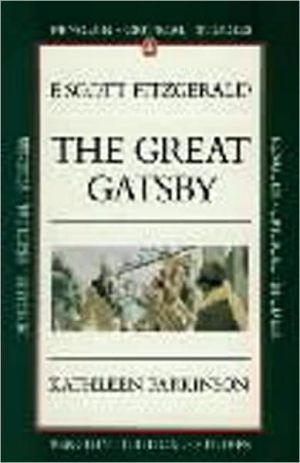

 |

|

The average rating for The Great Gatsby: Penguin Critical Studies based on 2 reviews is 3.5 stars.
Review # 1 was written on 2009-09-22 00:00:00 Christopher Arzola Christopher Arzola"The Great Gatsby" is one of the greatest works of 1920's literature. It also serves as one of the best windows into the wasteful lives of the diletantes who amassed great wealth in that decade before the bills for unregulated greed became due. Fitzgerald was a young Army officer in World War I who met a teenaged beauty, Zelda Sayre, while training in the South. They were engaged after the war but Zelda called it off because Fitzgerald was not wealthy enough to provide her with the life of leisure she needed. They were finally married after Fitzgerald met his first success as a novelist at age 24. Fitzgerald's ambition to become a recognized author was driven at least in part in an effort to satisfy Zelda's financial needs. Gatsby, also a young officer in training in Kentucky during the War, met a young woman named Daisy who could not marry him at the time because he was not wealthy enough to provide for her needs. He asked her to wait for him until after the War, but she instead married wealthy Tom Buchanan. What made Gatsby great was his ability to set goals that others would find unattainable, and to optimistically drive himself to accomplish them. He determined to make himself wealthy enough to win the love of Daisy Buchanan. We do not read of specifics in the novel, but we know that Gatsby becomes very wealthy after the War. He becomes a kind of mystery man who is the object of endless speculation about his source of wealth. Some people became very wealthy in the booze trade during 1920's prohibition, including Al Capone and other gangsters. Gatsby has a business associate either in the mob or with mob ties, and it is probable Gatsby became wealthy by rum running. His wealth has given him everything except Daisy. Trying to make up for lost time, Gatsby buys a mansion in West Egg. He can see the green light at the end of the Buchanan estate's dock from his home directly across the bay. Luckily, a young Ivy League graduate freshly out of WWI uniform, Nick Carroway, rents a modest house next door to Gatsby. Nick, like Fitzgerald before him, is a midwesterner transplanted to the Big Apple; he happens to be Daisy's cousin. Gatsby, who strikes up an apparent genuine friendship with Nick, nevertheless uses him to make an introduction to his former sweetheart. Daisy and Gatsby start an affair while her husband Tom continues his not-so-secret extramarital relationship with Myrtle Wilson, the wife of George, a down-and-out mechanic. Fitzgerald produces a work which is devoted to exposing the emptiness and hypocrisy in the lives of the beautiful people of the "Jazz Age." He makes you wonder why Gatsby was so obsessed with Daisy. She has everything: beauty, money, homes, a jealous-wealthy husband, a beautiful daughter, but she is a pampered, spoiled woman. Her superficial outlook on life includes the lack of outward affection even to her child. Nick, trying to get established in the bond business on Wall Street, becomes disillusioned and moves back home after witnessing his friend's ruin. Myrtle, no doubt hoping against hope for her association with Tom Buchanan to elevate her from the Wilson hovel to a classy life, meets a sudden and tragic end. And then there is Gatsby, who finds that great wealth buys great possessions, but cannot buy his former life with Daisy back. Fitzgerald is not content in leaving Gatsby ultimately holding the empty bag of unrequited love. He arranges for his public humiliation by Tom, who denounces Gatsby as a common bootlegger in front of their friends. In a way, Gatsby is a forerunner of Al Pacino's character, Tony Montana, in the 1983 movie "Scarface." Montana clawed his way from common origins by drug dealing, the modern version of bootlegging. Tony believed you needed lots of money to be respectable; money got power; and power got girls. We find that Gatsby likewise got more respectability in society than Tony Montana, possibly because he is a WASP. But he was still tainted as new wealth, as Buchanan reminds all of their friends, and he doesn't get to keep the girl in the end. Finally, Fitzgerald makes Gatsby the victim of his own emotions, placing him in line for his own physical destruction because he cannot reveal a crime committed by the woman who no longer loves him. The book's characters are sharply drawn and the story has enough twists and turns to keep the reader interested to the end. This is a highly enjoyable read. By the way, the edition shown with this review was not the one I read. Nothing against Kathleen Parkinson's study guide, but I read the edition with the original cover art reproduced; however, I couldn't access its through Goodreads when I did this review. |
Review # 2 was written on 2009-10-20 00:00:00 Venson Herron Venson HerronSad book, but teaches a good life lesson I guess. |
CAN'T FIND WHAT YOU'RE LOOKING FOR? CLICK HERE!!!